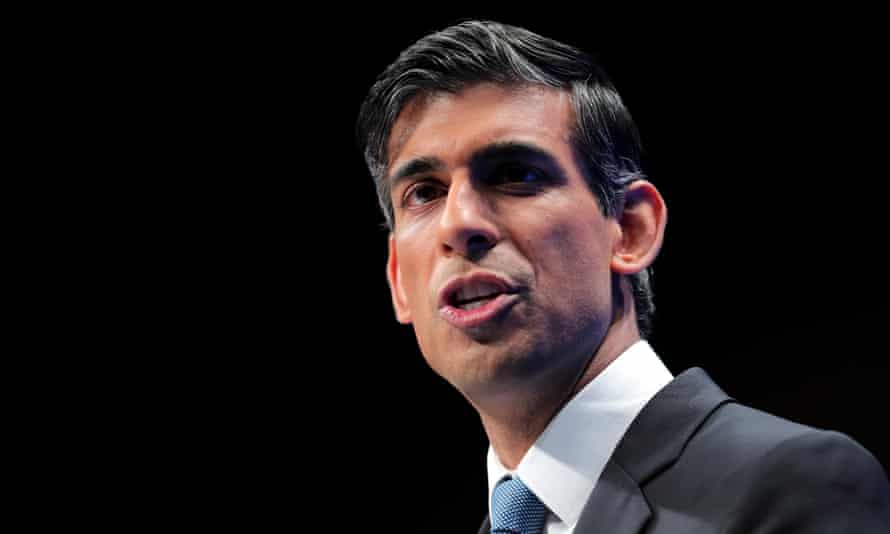Treasury leak reveals Johnson and Sunak divide over the cost of a carbon-free economy | Green economy
Confidential documents leaked to the Observer reveal an extraordinary rift between Boris Johnson and his Chancellor Rishi Sunak over the potential economic impact of moving to a carbon-free economy just weeks before the crucial Cop26 climate summit.
As Johnson prepares to put the UK at the forefront of global efforts to fight climate change and curb greenhouse gas emissions to host the Glasgow Cop26 meeting, the documents show that the Treasury Department is facing serious economic damage to the UK economy and Future tax hikes warns if the UK spends too much on green investments or redirects them.
Green experts said the Treasury Department’s “half-baked” and “one-sided” net-zero review only highlights the cost of mitigating emissions and not the benefits like green jobs, lower energy bills and avoiding the catastrophic effects of global warming. They said the review could be “armed” ahead of Cop26 by climate change deniers around the world, undermining Johnson’s attempts to play a leading role in climate change on a global scale.
The Treasury Department’s internal documents state that while UK businesses could get economic benefits from swift and adequate climate action, there is also a risk that business will be relocated overseas if businesses find their costs are rising faster than theirs foreign competitors.
The leaked p -ers are believed to have been produced to accompany a slideshow that was leaked in confidence to key groups outside the government last month. The documents say: “The investments needed to decarbonise the UK economy are uncertain but could help improve the UK’s relatively low level of investment and increase productivity.
“However, more green investments are likely to decrease returns and reduce the positive effects of increasing investments on GDP. Some green investments could crowd out other, more productive investment opportunities. If more productive investments are made earlier during the transition, that risk can be accentuated later during the transition. “
Regarding the risk of additional costs to businesses from green initiatives, the documents state: “UK climate action can lead to the relocation of business abroad if it leads directly to cost increases and it is more profitable to produce in countries with less stringent climatic conditions. ” Politics.”
On the tax implications, the documents state that the cost of moving towards net-zero could mean tax increases due to “the erosion of tax revenues from fossil fuel-related activities”. They say, “The government may need to consider changes to existing taxes and new revenue streams throughout the transition in order to achieve net zero sustainably and in line with government fiscal principles.”
Ed Matthew, campaign manager at E3G think tank, said, “This looks unprofessional and embarrassing to governments looking for Cop26. Britain faces the world on Cop26, trying to stimulate ambitious action from every country. Unless the government has made a solid economic case for action, it will seriously undermine these attempts. “
 Rishi Sunak should position himself as a climate skeptic. Photo: Michael Mayhew / Allstar
Rishi Sunak should position himself as a climate skeptic. Photo: Michael Mayhew / Allstar
The Ministry of Finance’s -proach is also in stark contrast to that of Economics Minister Kwasi Kwarteng and the analysis of the Office for Budget Responsibility (OBR) in a report published in July this year.
Regarding the cost of moving towards net zero, the OBR said in its report: “Between now and 2050 the fiscal cost of reaching net zero in the UK could be significant, but it is not exceptional … disaster could be the net fiscal cost be comparatively modest for the transition to net zero emissions by 2050. “
The Climate Change Committee, the government’s legal adviser, has also repeatedly said that the cost of action is small and is falling, at less than 1% of GDP by 2050, while the cost of inaction is big and increasing.
While there are concerns about how the costs could fall on poorer households, CCC chief Chris Stark has made it clear that by designing green policies, ministers can fairly distribute the costs and benefits.
Whitehall sources said Sunak was keen to position himself as a climate change skeptic in order to increase his popularity with members of the Tory party and compare it to Johnson’s green enthusiasm. “Rishi clearly sees an interest in showing that he’s not really done with this green stuff. He wants Boris to have the entire agenda. “
A source from the Department of Business, Energy and Industrial Strategy confirmed that the Treasury Department is “taking back” many of the green plans promoted by No. 10 and Kwarteng. “They are not climate change deniers, but they emphasize the short-term risks, not the long-term needs, which we emphasize.”
Contrary to the Treasury’s caution, Labor pledged at its latest convention to invest an additional £ 28 billion each year through 2030 to ensure a “green transition” that creates good jobs with decent wages.
The leak comes as the government prepares to release its long-awaited net zero strategy, as well as the heating and buildings strategy, which will include guidelines on reducing emissions and creating green jobs, including a 2035 ban on new gas boilers and grants for homeowners to move to green heating.
The government’s Cop26 president, former Economy Minister Alok Sharma, is embarking on a hectic final round of diplomacy, including with Chinese officials, amid speculation that President Xi Jinping will not attend the talks. In the last few weeks before Cop26, which opens on October 31, the US and EU are also talking to key countries with high emissions.
The Treasury Department said: “The government is committed to tackling climate change and the Prime Minister has put in place an ambitious 10-point plan to help us achieve this. The Treasury Department is playing a vital role in this effort by decarbonizing 12 billion homes. “


Comments are closed.